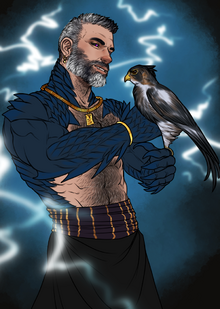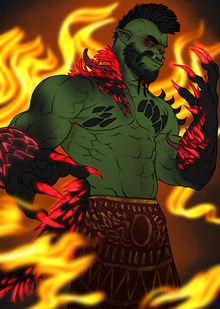More actions
| Draconism | |
|---|---|
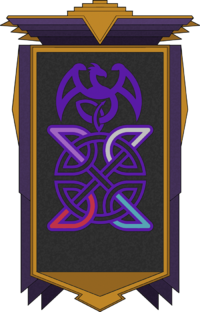 | |
| Religion | |
| Pronunciation | Dra-konism |
| Origins | Unknown, presumed over 70.000 years ago |
| Deities | |
| Regulus, Caius, Daiana, Triton, Nox, Marik, Severena, Aurora. | |
Origins
Draconism is the oldest Religion in the world, presumed to have existed in some form or another for nearly 100,000 years, though it is at the very least certain that the dogma has changed over successive generations. For example, the Maraya who have awoken from the Vaults, find Draconism radically different from what they remember in their Civilization, and even different from the archeological studies they did of the third Civilization that preceded them. Draconism styles itself after the values and principles of the Dragons in that Era, themed or styled in itself after the Races that roam the world at that time. It is as such an ever changing Religion that shapes itself based on the followers, though the Dragon Gods are eternal and remain largely similar with only their Race and some subtext changing between successive generations. Draconism has followers all over the world, but is generally speaking one of the weaker religions, being outclassed in number of followers by the likes of Unionism, Estelley, Fornoss, and some would argue even Evolism. Draconism has technically been a dead religion for 300 years, as the Dragons disappeared from the world in various ways, leaving behind their faithful who now worshiped in essence dead Gods. In the last few years however, Draconism has made a quick revival with many Temples being inhabited again, and the Dragons coming back alive in what is referred to as the Revival of Immortality.
History
To understand why the Dragons "died", it is necessary to understand the grand theme running through Draconism, being The Immortal War. The Immortal War refers to the endless conflict between the Dragons and what they call The Infection, which means Ordial/Exist/Void Essences that creep into the world of Aloria and attach to living and non living things there. The Dragons see themselves as natural wardens of the order of the world, and seek to remove The Infection from the world as a result. The Immortal War is mostly fought between Dragons and the Arken, at least historically speaking when they were still bound to Estel and Behesael. Each successive Void Invasion signals the failure of the Dragons to halt yet another end-times event, though after each cycle, the Dragons remain to restart civilization with new Races. Only the last (5th) Void Invasion was halted, when the Dragons performed the rite of the Denial of Immortality. In essence, Demons and Arken were immortal because the natural laws of Aloria allowed immortality. By denying immortality, the forces the Dragons fought could be killed, but they in turn were also killable. The Arken destroyed Estel and eventually Behesael in their betrayal, and the Dragons went out one way or another as the Immortal War essentially ended in a stalemate. The Dragons relented their efforts to kill the Arken, and contented themselves with the end of the Void Invasions, though recently, the Dragons seem to have come back from this decision, and have started reviving all over the world.
Virtues
Draconism does not have traditional Virtues and Vices in the sense that other Religions do. Draconism is a very sober and grounded religion in the sense that the meaning of life to Dragons is to exist, to perform a single duty, and then to die. That single duty, is the concept of pro-creation, or at least to ensure the future existence of the creation of Dragons and the world they tend. Morality of good and evil don't really apply to Dragons, though individual Dragons despise specific acts. For example, Regulus is a radical life-preserver who hates murder, while Caius followers engage in murder because they hate Magic. There are inherent contradictions in Draconism that can cause conflict among them, but generally speaking everyone works together towards the common goal of finding ways to rid the world more permanently of all Magical essence or presence. There is a final topic worth discussing: the (in)validity of other Religions through Dragons. It is pretty widely known that Dragons create both Races and Gods, but this fact does not make them Gods to other peoples and religions who do not observe them as such. Consider this metaphor: if you liked your team-leader, because he did good things for you and your goals align, your belief in your team-leader is not suddenly invalidated, because your team-leader was raised/taught by a different person. All Religions understand the mechanical purpose of Dragons in the world (conception, creation, ecosystems etc.), but reject their religious message or Dragons as Gods (except in some circumstances, like the Guided Cult of Unionism). Draconism is the only Religion without an afterlife, the faithful neither go to an afterlife nor to the Beyond, their souls are lifted up by Regulus and rejoin the Soul Rivers from which they are born, disappearing into nothingness and lending their life and memories back to the Dragons.
Gods and Goddesses
Draconism has several Gods (gender indeterminate, though when humanoid, they do appear gendered), making it a polytheistic Religion. Unlike many other polytheistic religions, however, Draconism has a clear hierarchy and even a form of competitive rivalry between the so-called Dragon Thrones. Every Dragon Throne (a group of Dragons) contains a leader who is the representative God, and the lesser named Dragons. These lesser named Dragons are not strictly Gods, but they are treated with great reverence. Not all Draconism Gods are currently alive, during the process of the Denial of Immortality, most Dragons died in a non-traditional sense (which also made the Religion "dead" for nearly 300 years save for areas like the Sihai Lands), with not all of them having been revived recently. It is possible to worship multiple Dragons, but because the Dragon Gods often conflict with one another even when they have a Dragon King, most Draconism followers worship a single God that best fits their principles and beliefs.
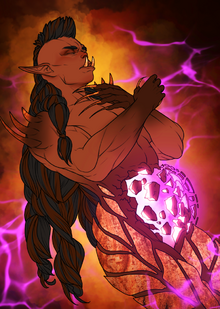
|
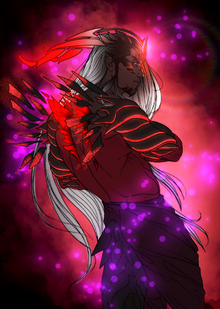
|
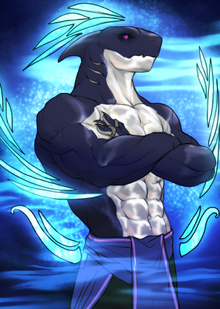
|
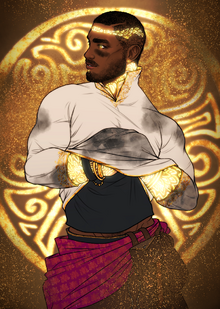
|

|

|
Expanded Lore
Expanded Lore exists to provide additional context and content on the individual Gods that is not necessary to understand what a God is about, but can help those who want to invest in this Religion Roleplay with more depth.
Regulus
Regulus is the Dragon-God of Command, Rule, Order, Souls, Time, and Lightning. Regulus is considered the warden of Time, by controlling the various strands of possible futures and lived pasts, while also preventing other forces from interfering with Time itself. Additionally, he is the Architect of Souls, through which the Draconism followers believe new souls are born in the world as he weaves their designs into existence. Regulus is a Blue Dragon, whose command over the weather and particularly express his Lightning symbolism. Regulus's primary agents are thought to be the birds, his eyes and ears, but also his messengers in the wider world. Regulus himself is always accompanied by his Falcon, on his shoulder, or high in the sky. Regulus is prayed to for direction and meaning, for aid in order and peace. As the Dragon-King, his role in the Conclave of Dragons is to mediate and preserve peace between the Dragons, even when they flaunt his control. His realm is the Central Junction, which rougly covers the lands of the Regalian Archipelago, Èriu-Innis, Etosil, Southwynd, and all seas in between. Regulus's largest Temple is the Draackenrust Mountain in Anglia, which is covered in shrines protected and operated by the Stormsong Archon, and the Life Isldar who migrated there. Regulus is strongly connected with the Anglian Witches and is generally seen as the most sociable of the Dragon Gods who speaks frequently to mortals, even if this is often perceived as cryptic. Regulus's current reincarnation is a 45 year old Ailor, also known as the Prince Cedromar of the Regalian Empire, though among his worshipers, he is primarily known and referred to as Regulus or the Imperial Dragon-Prince. Regulus is frequently challenged by the other Dragons, particularly Caius and Nox, both who believe Regulus is too much of a slow-acting centrist, and who tries to mediate too much between sides who will never see eye to eye. Regulus is best known within the Immortal War, as the Dragon whose policy is that of "Radical Life Preservation". What this means is that Regulus is ostensibly anti-Occult, but believes strongly that the Occult have the right to live and thrive, and extends a radical view to the protection of life to the non-Occult also. Regulus followers take great care to never kill unless forced to do so to protect other lives, never to step on an insect, never to kill an animal, leading to many of them being vegetarians.
Caius
Caius is the Dragon-God of War, Warriors, Strength, Power, Love, and Fire. Caius was once called the Fire Lord, on account of his control over the element of Fire and Passion. As the Void first erupted into Aloria, the Dragons did not know what they were dealing with, and Caius was the only one to enter the Void. Doing so trapped him in a realm that was bereft of the laws of reality from which the Dragons function, so it took all might of the Dragons to pull him back. While they brought him back, his soul was split in half, with one half remaining in Aloria, and the other half in the Void that would eventually become the Void God Ifrit of Void Worship (called Triton in Draconism). Since then, Caius has slowly been dying, kept alive by Dragon Magic and the heat-core of the world while the Void corruption of part of his soul eats up his body from the inside like an ever-expanding cancer. While Caius was once a Dragon whose heat gave way to love, this imminent death has caused Caius and his followers to become violent and borderline genocidal against the Occult, hoping that by purging all the Void-infected rot of Aloria, they can sever the connection between the two worlds and halt the slow death of their lord. Caius is by nature a Red Dragon whose symbolism expresses itself in the fire he breathes, but his body has slowly become blackened with rot. As the Dragon-General of the Dragon Conclave, Caius's role was to lead the military arm of the Dragons that would protect the faithful and the world as a whole, but has since become the majority of the fighting forces of the Archon against the Occult during the Immortal War. Within the context of the Immortal War, it should as such not be surprising that his policy is "Radical Extermination", where all Occult-tainted entities must die to sever the connection between the Void and Aloria. While this would normally mean a disregard for the Ordial and Exist-based forces, because the purges of Caius are indiscriminate, they are usually included as well. All of Caius's Archon are violent and desperate to save their God, wishing death and destruction on many others to save him, and anyone else affected by Void rot. Caius is the most unforgiving god, whether by his rage and grief at his condition, or just because the raging fire has no temperance. Caius's largest Temple is that of the Rock of Eternity, the largest volcano in the world which houses Junction West, which covers roughly the territory of Guldar and the Drifting Isles. Caius's servants however, in their desperation or disgust at the Occult, reach far and beyond, into the territory of other Dragons, where they compete with the local forces over the cleansing of the Occult. Triton's role as both a Void God and a representative of the split in Caius's Soul is explained further below in a separate section that covers why many Draconism followers see Ifrit as a God too.
Daiana
While other Dragons manifest on Aloria's surface and roam, and can be met in person, Daiana is not one such Dragon. Her existence is more metaphysical, as her body is the planet core itself, in a way she is Aloria itself, though she does have an astral projection that can be perceived in visions or manifestations (which is why her appearance is generally understood). Daiana is the Dreaming Dragon, because her Dreams manifest reality itself, the rules of the world, but also the Gods and sometimes even people themselves. Daiana in a way could be considered the entity that dreams up all native Alorian Gods (so not Evolism Gods for example), but does so in an unconventional way. Daiana is directly affected by the living on Aloria in the same way that her dreams affect them. For example, when the proto-Velheim people who had no Gods or believed in different Gods dreamed of a better future, or had hopes of freedom from war and suffering, Daiana dreamt of the Fornoss God Bard who embodied their strength, bravery, and capacity to fight for themselves. Daiana does not decide what Gods are born, her dreams dictate their themes, but those themes and concepts are also fed to her by the living of the world. Daiana also dreams of people, on occasion, creating the uniquely different Draconism Godborn, who are not actually conceived or born through natural processes, but dreamt up by Daiana's dreams of fate. Draconism Dreamborn (Godborn) are always born as full grown and capably thinking adults for a specific fated reason (literally appearing somewhere in the blink of an eye), which is not always clear to them. Some are dreamed up to protect a temple of specific person, while some might be born with insurmountable tasks like ending the decline of the Dwarven Race or destroying the Dread Empire. It is also possible for Daiana to dream up new Dreamborn for the ones that she has already dreamed of, if they failed to fulfill their destiny in time, or turned away from their fate. Daiana is especially valuable to the Eronidas, because she fulfills the role of Mother Earth, the closest concept in our lore to Gaia, the soul of the world itself. The Eronidas believe all their shamanistic powers derive from her, and believe that Caius is her husband, though such a connection isn't strictly proven and largely impractical because Caius is a literal Dragon while Daiana is the metaphysical concept of one. During the Denial of Immortality, Daiana never "died" or disappeared, though she also only communicates with a handful of people in an Elven lifespan. This circumstance has led some to believe that Daiana was never really alive, and exists in a state transcendent of living or death.
Triton
Triton is the second half of Caius's split soul, and in being so, he is a Void God. Triton was once caught in the Void, but when Behesael was killed, broke free from the Void and chose life on Aloria. This creates the strange circumstance for Draconists and Dragons, in that an Occult Infected Dragon exists in the same plane of reality as his other half, Caius. Attempts have been made by the Dragons to re-merge the two halves, but eventually aborted as Triton and Caius both violently resisted any further attempts, wishing to preserve their individual identities, but also the other Dragons finding discomfort with the idea of killing one of their own, even if Void Corrupted. Triton physically manifests in Aloria, and engages in a variety of plots and machinations that sometimes go against the Dragons, but often align with them. For example, his favor for the Drakon Cult Kathar is unusual, especially since Caius wants to exterminate them, while others don't even want to tolerate them. Triton's actions very much style towards the weaponization of the Void itself to fight the Void, but there is a definite undercurrent of trying to prove that Void and Draconic combinations are superior to Dragon or Void creations alone. Some in fact speculate that if Caius and Triton were ever to come to blows (both considered the strongest of Dragons), that Triton would win this fight with ease. It is unclear what happens if Caius were to be completely absorbed and corrupted by the Void, as this would put him in the same category as Triton. Some speculate that when this occurs, Triton and Caius's souls will re-merge, because Triton's soul is part of Caius's with Void alignment layered on top, and when that completes for Caius, the two will be identical. It is equally unclear whether Triton will always be aligned with the Dragons, or has some greater intention to betray them, though this seems to be a topic that most Dragons are more than content completely ignoring.
Nox
Nox is a complicated figure in the Draconism faith, as well as among Dragons, because of the amount of discord among Dragons he creates. Nox is the father of all Slizzar, not in the literal sense, but in the sense that he created them against the wishes of the other Dragons, and while stealing the gifts of Aurora to do it. When Dragons create life, they adhere to strict rules of what life can and cannot be. For example, it must have free will, it must live and die, and it must remain the same shape throughout most of its life. Nox broke these rules by making the Slizzar, both in that they live far beyond reason, but more importantly because they are Shapeshifters, that which the Dragons specifically prohibited to exist to preserve the natural Eco System. Nox was punished by the other Dragons by having his influence over the Slizzar severed. His soul was split (in a method not too dissimilar from Songaskian creation) into several Slizzar mortal bodies, the Anindriya Slizzar, so his consciousness could not complete his plans, but his followers and Soulcores would continue to function in his absence. Nox seemed to have outsmarted the other Dragons however, because part of his soul was imbued into the law of reflection, meaning that in every reflection experienced in the world whether by mirror or by calm pond of water, Nox's soul partially exists in the mirror world. Over the centuries while other Dragons have died or entered deep slumber, Nox's power had slowly been returning, so much so that he started actively interfering with global events. Some events should however not be misinterpreted as his. The Essa Empire, when the Slizzar puppeteered the Allar en masse to create their own Empire, was specifically not his doing, when an Arken abused his absence and lack of power to manifest in the world to masquerade as his will and representative to unify the Slizzar in this act. What Nox has been planning, or what he has been doing, remains a mystery to many, including his own Slizzar. Some however have posited that sometimes, these plots have no purpose, and that Nox much like other Dragons is subject to mortal desires and free will, and that his plots can in fact be for the simple reason that he enjoys feeling like a God and outsmarting everyone, or being an unseen hand that has guided history. There are even some so bold to claim that Nox was in fact responsible for the Essa Empire folding so rapidly, as he puppeteered the Mai-Allar to rebel against the other Allar and Slizzar, and aid the Regalians in knowing where all the military installations were, and helping the Regalian Empire crack another Empire in record time. The most sinister of plots that Nox is speculated to have engaged in (but for which no hard evidence exists), are the Yellow Dragons. There are in fact no Yellow Dragons, and while the entity called Zanobi was very real to the Allar, and the events concerning the Yellow Dragons were also real with regards to their society, it remains the fact that they are not part of the Dragon pantheon and don't exist in the historical context. Dragon Scholars have speculated that Zanobi and the Yellow Dragons were in fact a deceitful manifestation of Nox and the Silver Dragons, to create more compliance in the Allar to abandon their Evolist ways, and shy away from the corruption of the Void. The Allar who fled Sendrass did so because of the cruelty of the Sendrassian Allar, but the majority of them still observed some relation to Evolism and the Void Gods, which Zanobi was instrumental in weening them off of. It is thus reasonably possible, that one of the most traumatic events in Allar history, the diseased death of the Zanobi, was a skilled piece of gaslighting propaganda by Nox to firmly press onto the Allar that the Void is bad.
Marik
Marik as a figure is somewhat enigmatic, even for Draconism faithful who generally act smug about knowing more about the world than non believers. Marik prior to the Sariyd conflict was a very recluse Dragon who lived mostly on uninhabited lands, tinkering with mineral compositions and rare earth metals in the world. Even when the Machinist started investing in the early Sariyd in Marik's backyard, he seems to have taken a backseat role in doing nothing about it, up until the point that the Machinist took its revenge and crept its way back in power among the Qadir through the priests unknowing use of Machinist equipment. There are some that speculate that Marik assisted the Sariyd in their original rebellion against the Machinist, but since the soul of Al-Muqallid being eaten by the Beyond, and Marik dying, there is no person left alive who might remember, except perhaps for Triton who won't say. Marik created the Bralona Race as part of his intelligent artificial lifeforms used in the war against the Sariyd. Historical telling completely negates the existence of the Bralona on Ard al-Nur, primarily because all Sariyd who would live to tell the tale died in the Great Storm, and because Regulus wiped the memories of all Bralona, and dumped them all on the island Justinia after refusing to kill them due to his belief that all living things deserved a chance at life. Marik was eventually killed by the Ordial Death-Lances even before the final siege that initiated the Great Storm occurred. Historical telling among the Sihai and Qadir has it that Marik was with the Dragons up on the mountain, but once again Regulus wiped the memories of everyone involved to try and hide the fact that Dragons could be killed in the physical sense by Ordial weaponry. Marik's soul however could not be killed, because the existence of Dragons in Aloria is inherent to its natural laws and because Daiana still dreamt of him, as she does of all the Dragons. As such, Marik's soul was reborn in the body of Al-Asir, who would later go on to become the God of the Qadir and become part of Unionism under the auspices of the Everwatcher. A studious reader might observe however, that the Qadir are universally Agnostic or Unionist, never Draconists. This is because the Qadir still have societal trauma towards the concept of Dragons, and because Al-Asir (or Marik, depending on the naming chosen) has made an active effort to distance himself from Draconism, and be closer to the Qadir in the spirit of redemption for his greatest failure, being that his soul and his Dragons permitted their minds and bravery to falter and cause the Great Storm, causing the deaths of tens of millions of Qadir. In a way, his life as Al-Asir is atonement, though the Draconists can still experience the soul of Marik through him. Al-Asir still loves all the same things Marik did, and still has the same powers as Marik. In such a way, Marik and Al-Asir being the same entity mean that this is a God shared by two Religions, which is a rare occurrence in the world. Marik's identity in that regard is complicated. He is primarily the patron Dragon God of the Songaskians, and the leader of the Bronze Desert Dragons who gave up their souls and bodies to birth the Songaskian Race. The Songaskians know and ackowledge Al-Asir is the bearer of Marik's reincarnated soul (just like Cedromar is the reincarnation of Regulus), but this is not accepted fact among the Unionists, or the wider Qadir Race. To the Qadir, Al-Asir is their God alone, they actively reject the notion that he is Marik's atonement, and may get violent to press that point. This is because for Qadir, the notion of accepting a Dragon as God when Dragons were (from their optics) part responsible for nearly wiping out their Race, even if deceived and puppeteered by the Machinist Ordial God. For Songaskians, the war with the Qadir is fresh in the mind, but they don't have the baggage of 40 million of their Race choking to death on sandstorms. It is speculated that the Qadir will not accept Al-Asir as Marik's alter ego, will only occur, when the Qadir individually or as a society can let go of the racial trauma of the Great Storm. Al-Asir is also not exactly Marik. A good analogy is that al-Asir is a clone approximation of Marik through which Marik can be experienced in his powers and wisdom and interactions, but that the original Marik is dead. That does not however make the Songaskians agnostics or atheists either, as those who want to actively worship living Dragons can just swap patronage, and those who do not care can continue to worship the qualities of Marik as they were known in past ages. Just because a God is dead, does not mean their message is no longer valid, and Marik's message still lives and breathes in Al-Asir.
Severena
Severena is most political and temporal of the Dragons, having taken a role in mortal society in a way quite unlike many of the others deigned to do until very recently. She and her Clade, the White Dragons, are responsible for the origin point of Sihai civilization and almost all Sihai political and cultural structures that have persisted to the modern day, where they are recognized as the ultimate arbiters of morality and maintain a degree of staying power and ability to give orders in exchange for the extensive benefits of their protection. When Cataclysm struck the rest of the world and many other Dragons engaged in the Denial of Immortality, choosing their own ways to perish, the Sihai Dragons chose to self-sacrificially enter a slumber they could not leave to maintain the Jade Wall, a series of complicated fortifications enchanted to help the Sihai fight off against the waves of Demons which have assailed them since that time. Very recently, in the process of reversing the Denial, other Dragons traveled to the Sihai lands and awoke the White Dragons once again. Amidst political chaos related to their awakening and a civil war caused by the realization that a terrible fate had befallen a portion of the Sihai homeland, with the Dragons unable to protect them (read the Sihai page for the fate of the Sheng Empire to learn more), it is unclear how many of them are awake, whether it is just one or all. But Severena herself, at least, is known to be awake once again. Severena stands for the virtue of transcendence: her "Radical Ascension" philosophy stands for the idea that Occult persons themselves do not commit a sin by existing, but rather that Occultism is begat by sin, that there would be no Renegade Mages or evil sorcerers if the same impulses that created murderers no longer existed, and that the key to victory over Demonic forces is cultivating virtue in the people rather than any arcane-related solution. To this end, Severena's worshipers tend to adopt a very detached, self-perfectionist attitude where they meditate on abandoning their own flaws and attachments in the hopes that others will follow their example and turn to the beauty of Draconic creation. Not just Sihai worship Severena, as well: her immortal concept that the war against the impure starts within the self is popular with many ascetic types, leading to her having a syncretic following among many Dragon Monks, even those who worship other Dragons as primary, as someone whose advice is simply wise to keep. It is also important to understand that Severena's philosophy does not encourage apathy and doing nothing, because sometimes other people do not know what is good for them and have to be guided to the 'correct' spiritual solution. Her worshipers are more than happy to lend their ancient wisdom to all sides of the Draconic cause (though usually Regulus) in their shared goals.
Aurora
Aurora is the most anti-social of all the Dragons, who sometimes shows active contempt for her own creations (especially the sentient mortals), with the sole exception being the Urlan, who she considers the perfect creation and beyond anything she has ever made. The Urlan refer to Aurora as Valerius or the Hunt-Mother, even if they are not Draconists. She fulfills a more secular creationist role for them in the same way that Daiana is a mechanical aspect of god-birth to other Religions. Aurora created the Urlan because she lacked faith in the other Races to live up to her expectations of the apex creature at the top of the food chain, and acting as her representation in preserving the eco system by culling over populations and hunting over-active predators, as well as disrupting factors. Urlan to Aurora, are self-perpetuating creation, especially because they can convert other Races to their own ranks, and have unique defenses against the Occult that Aurora considers design flaws in other Races for being absent. Aurora did not always favor the Urlan so, as she was a fervent supporter of the Dragon Cultists among the Allorn Empire who acted as protectors of the Craters of Creation where she experiments with life forms. She eventually perished in the wars against the Elves and Dwarves (and took a good portion of Dwarves with her), in an event not too dissimilar to how Marik's soul was abused by an Ordial Entity to cause death. The Glacial Ordial Goddess used Aurora's Magic to birth the Isldar and kill hundreds of thousands of Dwarves and Elves, while also putting an Ordial entity called Frisit in her corpse to deceive the Isldar into secretly worshiping her while they thought they remained faithful to the Dragons. This deceit was eventually discovered when the Dragons revived Aurora, unmasking the Frisit beast, and the Glacial's plot, which would result in the Isldar civil war where one side reconnected with Draconism, while the other side threw their lot in with the Glacial as their true protector and became the Death Isldar. While Aurora still shows some favor and connection with the Life Isldar, her pride and glory goes to the Urlan, who have since also become stalwart allies of the Life Isldar as two perfect halves of preserving eco systems in a way that Aurora is perhaps too shortsighted to appreciate. After all, while the Urlan are the apex hunter, the knowledge and information gathering as well as the analytical insight of the Life Isldar is unmistakable, and the two of them combined make an undefeatable combination.
Priestly Activities
To be Expanded.
Trivia
To be Expanded.
| ||||||||||
| Accreditation | |||||||
|---|---|---|---|---|---|---|---|
|
| ||||||
